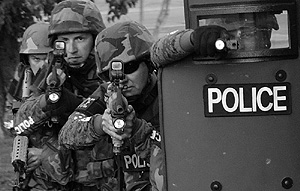Why Are Cops Acting Like Soldiers?By Carl CloseIndependent Institute Mar. 28, 2013 |
Popular 
Trump Threatens War With Iran If No Nuclear Deal: 'There Will Be Bombing' Like They've 'Never Seen'

Rabbi Tells Senate Hearing It's 'Not Enough' to Be 'Not Anti-Semitic' - 'One Must Be Anti-Anti-Semitic'

Kentucky Rep. Thomas Massie Introduces 'Dual Loyalty Disclosure Act'

Sen. Schumer: 'My Job is to Keep the Left Pro-Israel'

Randy Fine, Who Celebrated Israel Killing An American Citizen, Struggling in Florida House Race
  From the early days of the United States to the post-Reconstruction era and beyond, Americans viewed the separation of the military from law enforcement as essential for the health of the republic. In recent years, however, the line between the police and the military has become increasingly blurred, with police departments across the United States employing "no knock" raids and other military-style tactics once considered off limits. What has caused this alarming trend? From the early days of the United States to the post-Reconstruction era and beyond, Americans viewed the separation of the military from law enforcement as essential for the health of the republic. In recent years, however, the line between the police and the military has become increasingly blurred, with police departments across the United States employing "no knock" raids and other military-style tactics once considered off limits. What has caused this alarming trend?Writing in the Spring 2013 issue of The Independent Review, economists Abigail R. Hall and Christopher J. Coyne argue that the police have begun to resemble the military primarily because of two developments: the "war on drugs" and the "war on terror” (see “The Militarization of Domestic Policing”). In 1981, for example, President Reagan signed the Military Cooperation with Law Enforcement Act, a law that granted the Pentagon permission to assist domestic police departments engaged in enforcing the nation's drug laws. Similar legislation accompanied efforts to combat terrorism even before 9/11. A 1997 federal law known as Program 1033 made it easier for state and local law enforcement agencies to obtain surplus military hardware--including body armor, armored vehicles, and surveillance equipment--for use in counterdrug and counterterrorism activities. In 2011, the program transferred $500 million worth of equipment to state and local law enforcement agencies. Their lobbying efforts are one reason why the domestic "wars" on drugs and terror are very likely to continue. "These crises have created a set of conditions in which the blurring of police and military activities is self-enforcing and self-extending," Hall and Coyne write. "Even if one assumes that citizens generally agree that the separation of police and military functions must be reestablished (a huge assumption in itself), working against the present policies implies tearing apart the massive drug--terror complex, an institution that benefits from a permanent state of war domestically and internationally." |



